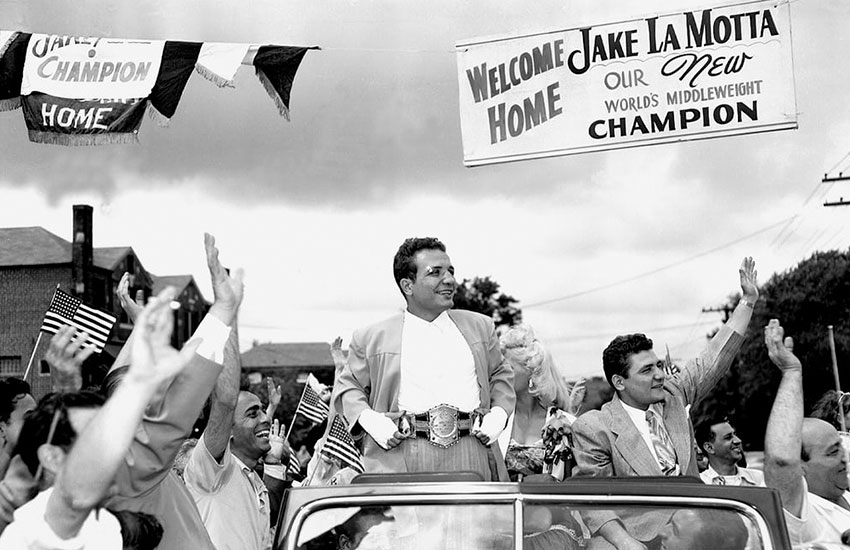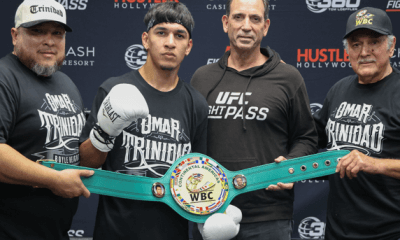Canada and USA
The Jake LaMotta Story: Boxing as an Act of Contrition

Each time that boxing writers come up with an “all-time list,” the name of Giacobbe “Jake” LaMotta is usually mentioned among the top ten spots in the “chin” category. The legendary “Bronx Bull” had an unusually high tolerance for punishment that has not been seen in a boxing ring too often, and he put it to the test against some of the heaviest punchers in two divisions almost without even touching the canvas in more than a hundred pro bouts.
On Tuesday, September 19th, however, the ineluctable blow of death finally caught up with him after chasing him through the dark alleys of New York City and the boxing rings of the world for the better part of the past 95 years, when he was still the oldest champion still alive to tell his extraordinary story.
The story that we refer to had already been told, albeit partially, in the impeccable “Raging Bull,” a movie in which a young Robert DeNiro portrayed LaMotta in what is now widely considered the finest boxing-themed motion picture ever. But just as with any other boxing story adapted to the big screen, there were many lapses or “poetic licenses” taken by its director Martin Scorcese in his quest to summarize LaMotta’s tumultuous life into a viable screenplay.
And it is perhaps in those hidden and forgotten moments that the movie failed to highlight that we may find some of the most extraordinary aspects of LaMotta’s character as a fighter and as a person.
As much as LaMotta was a bull in the ring during his fighting years, he was a bullied child in his early youth. But all that ended on the day in which his father found him curled up and crying his misfortunes in a corner. After recriminating his weakness and giving him a preemptive beating to accentuate his imminent lesson in life, his father handed him an ice pick (a simple and fearful tool, consisting of a wooden handle with a protruding and sharp iron rod) and gave him a recipe in violence and fear that young Jake would later translate into his more than 300 boxing matches between amateur and pro: “hit them first, and hit them hard.”
Poverty, marginality, the surrounding violence of his neighborhood, the turf wars in which young men from all ethnic and national backgrounds fought in the streets, and of course, the pressure from his fellow troublemakers (including future champ Rocky Graziano, among others) drove Jake to use that tool and that ill-advised recipe in an early run as a teenage hustler. And it was then that he lived through an episode that expanded upon the bitter offensive advice of his father to also define his defensive philosophy, if he ever had one.
At the age of 17, Jake bludgeoned a local bookie named Harry Gordon with a lead pipe in his effort to steal his wallet, which turned out to be empty. When the next day’s newspapers informed him that Gordon had died, Jake was suddenly overcome by a measure of guilt that could not be bought off with all the money in every wallet in the world, and which haunted him for the rest of his life.
That guilt permeated into his labor in the ring, where Jake fought for more than 12 years with the urgency of a bullied child holding his ground with an ice pick in one hand and the remorse of a young man keeping a horrendous secret in the other. He punched to kill, and allowed others to punch him to death. The most basic survival instinct of self-defense through aggression was combined with the submissive accumulation of punishment as an act of atonement and penitence to produce a cruel and compelling spectacle, summarized by one of his trademark phrases: “subconsciously, I fought like I didn’t deserve to live.”
But in spite of his death wishes, and against all odds, Jake endured. Even though he stuck his chin out to the Grim Reaper during each round of each one of his 106 professional bouts, LaMotta didn’t even touch the canvas until the very end of his career, when he briefly went down against Danny Nardico in a light-heavyweight bout. The (largely fictitious, but very emotional) scene in which LaMotta taunts his sworn enemy Sugar Ray Robinson by telling him that “you never got me down, Ray” during their six-bout series (with Jake’s victory in the second fight putting an end to Robinson´s 35-fight unbeaten run, and the only loss in an amazing 128-1-2 streak in 11 years by the consensual best pound-for-pound fighter of all times) became one of his most defining moments.
But the reason why LaMotta walked through all that punishment is equally defining of his character. The guilt over Gordon’s murder that tormented him during most of his career became the reason for his calm acceptance of all that brutal physical attrition, which lasted until the terrifying and unthinkable moment in which Harry Gordon himself, looking older, heavier and sporting a rather large scar on his scalp, walked up to Jake after one of his fights to salute him and casually reminisce about their years as neighbors in the Bronx, oblivious to the fact that it was Jake himself the author of the murderous blow that rendered him unconscious for the six long weeks during which the newspapers mistakenly declared him dead, only to recover and then move to Florida because “you know, Jake, the Bronx is a dangerous place.”
Freed from his mortal sin but not completely unburdened of his shame, LaMotta continued fighting a few more years until he finally agreed with Harry on the physical and spiritual perils of living in the Bronx and proceeded to move to Florida as well, where he would also grow fat and old, get married half a dozen times, spend a season in jail and add even a few more colorful pages to the playbill that would later become a cinematic masterpiece.
Scorcese’s poetic licenses do not stop at the elimination of virtually every mention of Harry Gordon during his extraordinary film. There are some who swear that LaMotta almost never uttered profane words, even though DeNiro spells out some of the darkest pages of the New York slang dictionary during his masterful characterization of LaMotta. There is very little mention of LaMotta’s heroic stance against the mafia, led in his time by the ineffable Blinky Palermo, to whom he succumbed briefly in 1947 when he threw a fight against Billy Fox as a prerequisite to be allowed to fight for the championship only after allowing the so-called “cosa nostra” to make a fortune in misplaced bets. But LaMotta’s tortured spirit had already learned a hard lesson on the dangers of keeping an asphyxiating secret in his chest, and he would later find some solace in his testimony before the U.S. congress where he denounced his own “paesani” and helped dismantle the very organization that kept his career in the shadows for so long.
Perhaps one day those will be the memories that will outweigh the legend that was imposed upon us by the powerful filter of Hollywood’s lenses, and this will finally be the Jake that we will all remember The son who was so afraid of his father that he would rather exert terror upon his neighbors and ring foes before disappointing him once again. The eternally forward-charging pugilist, always stalking his prey, thirsty for his foe’s blood as well as his own. The Italian-American tough guy who would rather face and beat the mafia instead of joining them. The proud champion that outlived every one of his victims and conquerors and who left his legacy marvelously chronicled in a memorable film.
And of course, the kid who threw punches to survive on planet Earth and who gladly took them back in bunches for a chance to earn, one distant day, a place in Heaven.
Check out more boxing news on video at The Boxing Channel.
-

 Featured Articles3 weeks ago
Featured Articles3 weeks agoThe Hauser Report: Zayas-Garcia, Pacquiao, Usyk, and the NYSAC
-

 Featured Articles2 weeks ago
Featured Articles2 weeks agoOscar Duarte and Regis Prograis Prevail on an Action-Packed Fight Card in Chicago
-

 Featured Articles1 week ago
Featured Articles1 week agoThe Hauser Report: Cinematic and Literary Notes
-

 Book Review4 days ago
Book Review4 days agoMark Kriegel’s New Book About Mike Tyson is a Must-Read
-

 Featured Articles4 weeks ago
Featured Articles4 weeks agoManny Pacquiao and Mario Barrios Fight to a Draw; Fundora stops Tim Tszyu
-

 Featured Articles4 weeks ago
Featured Articles4 weeks agoArne’s Almanac: Pacquiao-Barrios Redux
-

 Featured Articles3 weeks ago
Featured Articles3 weeks agoRemembering Dwight Muhammad Qawi (1953-2025) and his Triumphant Return to Prison
-

 Featured Articles4 weeks ago
Featured Articles4 weeks agoOleksandr Usyk Continues to Amaze; KOs Daniel Dubois in 5 One-Sided Rounds

















